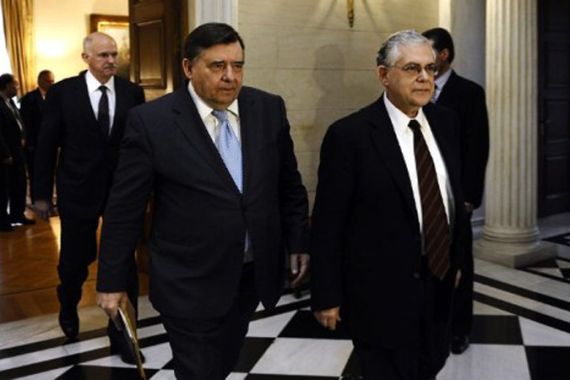Greek PM seeks consensus on bailout plan
Papademos is meeting coalition leaders over new austerity measures as delays push Greece to brink of bankruptcy.

Greek leaders are holding talks to discuss the latest package of austerity measures demanded by Athens’ international creditors in return for a bailout payment to save the country from bankruptcy.
Wednesday’s talks between Lucas Papademos, the Greek prime minister, and leaders of the three parties who back his emergency coalition government, were originally due to take place a day earlier.
Keep reading
list of 4 items‘We need you’: Solomon Islands’ support for US agency’s return revealed
Why are nations racing to buy weapons?
Parallel economy: How Russia is defying the West’s boycott
Papademos, an unelected prime minister who was appointed in November to steer Greece through its financial crisis, is seeking to push through financial reforms to secure $172bn in funds from the International Monetary Fund, the European Commission and the European Central Bank – the so-called “troika” – to avoid a March default on its bond repayments.
But the measures are unpopular with many Greeks, with workers staging a 24-hour general strike on Tuesday in protest over proposals which would see 15,000 civil service employees lose their jobs this year.
In Athens, protesters scuffled with police outside parliament, the site of frequent anti-austerity demonstrations in recent months.
German Chancellor Angela Merkel and French President Nicolas Sarkozy, the leaders of the eurozone’s two largest economies, are pressing Greece to act fast amid fears a Greek default would jeopardise the economic health of the entire single currency bloc.
As well as the austerity measures, the bailout also depends on separate talks with banks and other private bondholders which would see about $131.6bn written off Greek debt.
Others have suggested that the rest of the eurozone is strong enough to survive without Greece, should it fail to get its finances in order.
“We are currently so strong in the rest of the eurozone… that we can handle an exit of Greece – a Greece which runs into serious trouble,” Mark Rutte, the Dutch prime minister, said on Tuesday.
“They really have to implement all the measures they have promised to take. If that doesn’t happen we can’t help them.”
But Greek coalition leaders, who could face public scrutiny in elections in April, have shown little urgency to resolve the issue in recent days.
‘There is time’
“We can’t say a plain yes or no unless we have assurances from the relevant authorities of the state that these actions are constitutional and will lead the country out of the crisis,” said George Karatzaferis, the leader of the far-right LAOS party.
“There is time. When it comes to future of the country, we will find the time,” he told reporters.
The proposed public sector job cuts signalled a major shift in government policy, as state jobs had so far been protected during the country’s two-year financial crisis.
While the government had promised to reduce the 750,000-strong broader public sector by 150,000 by the end of 2015, it had previously insisted that it could reach that target through staff attrition.
“The current policy of austerity is turning workers into pariahs, jobless people and pensioners into paupers and deprives our youth of any hope,” a statement from the main civil servants’ union Civil Servants’ Confederation (ADEDY) said.
Yiannis Panagopoulos, leader of Greece’s largest union, the General Confederation of Greek Workers (GSEE), said the creditors’ demands were certain to lead to more hardship.
“What is going on is not a negotiation,” he said. “It’s blunt, cynical blackmail targeting an entire people.”
John Psaropoulos, reporting for Al Jazeera from the site of protests in Athens, said that the two umbrella unions representing 2.5 million workers were calling their workers off their jobs.
“The strike is going to be the beginning of the a number of planned industrial actions this month to protest against what seem certain to be austerity measures in both the private and public sectors,” he said.
Workers were expecting further cuts to private-sector wages, affecting many people on the minimum wage and increasing the number of people living below the poverty line, our correspondent said.
He quoted union leaders as claiming that 1.5 million people were living without a single euro of income at the moment.
Our correspondent said that the Greek government was trying to slowly introduce a number of the troika’s demands.
“On the substance there have been efforts to commute certain kinds of paycuts and pension cuts to a gradualised form.”
He said over the last three days the government appeared to have been leaking details of negotiation to the press to test public reaction. Later, politicians would either deny or confirm the reports, he said.